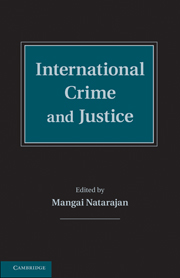Book contents
- Frontmatter
- Contents
- List of Figures
- List of Tables
- List of Contributors
- Foreword
- Preface
- Introduction
- Part I International Criminology
- Part II Law, Punishment, and Crime Control Philosophies of the World
- Part III Transnational Crime
- Part IV Organized Crime and Terrorism
- Part V International crime
- Part VI Delivering International Justice
- Part VII International Cooperation and Criminal Justice
- Part VIII International Research and Crime Statistics
- Part IX International research resources
- World Map
- Index
- References
Introduction
Published online by Cambridge University Press: 05 October 2014
- Frontmatter
- Contents
- List of Figures
- List of Tables
- List of Contributors
- Foreword
- Preface
- Introduction
- Part I International Criminology
- Part II Law, Punishment, and Crime Control Philosophies of the World
- Part III Transnational Crime
- Part IV Organized Crime and Terrorism
- Part V International crime
- Part VI Delivering International Justice
- Part VII International Cooperation and Criminal Justice
- Part VIII International Research and Crime Statistics
- Part IX International research resources
- World Map
- Index
- References
Summary
Criminology seeks to explain the nature, extent, causes, and consequences of crime, while the discipline of criminal justice deals with society’s response to crime – how this response is conceived, organized, administered, delivered, and evaluated. For most of their histories, these disciplines have focused on lower-class offenders committing street crimes that impact local neighborhoods and cities. They have paid relatively little attention to corporate or white-collar crimes and they have paid even less attention to studying the cross-cultural context of crime and the different national responses to crime.
In the past two decades, scholars have broken out of this mold and have begun to extend the boundaries of criminology and criminal justice. Specifically, they began to study crime patterns and evolving criminal justice practices in other parts of the world, using their own countries as benchmark comparisons. Their pioneering work resulted in “comparative criminology” and “comparative criminal justice” becoming established subfields of the broader disciplines (Mannheim, 1965; Mueller & Wise, 1965, 1975; Clinard & Abbott, 1973; Chang, 1976; Newman, 1976; Shelley, 1981a, 1981b; Terrill, 1982; Adler, 1983; Johnson, 1983; Bayley, 1985). One of the facts exposed by this body of work, increasingly recognized by the United Nations and the World Bank, is that the rule of law is not simply the result of economic and social progress; rather, it is a necessary condition for this progress to be achieved.
- Type
- Chapter
- Information
- International Crime and Justice , pp. xxiii - xxxviPublisher: Cambridge University PressPrint publication year: 2010



